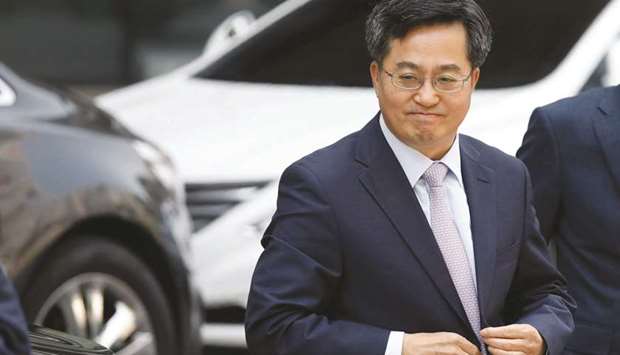In an interview before the annual meeting of the Asian Infrastructure Investment Bank (AIIB) in South Korea this weekend, Finance Minister Kim Dong-yeon told Reuters multiple factors have contributed to soaring household debt, which now equals more than 90% of South Korea’s gross domestic product.
“It would be an exaggeration, or too strong to say that low interest rates are themselves the cause of the household debt,” said Kim, formally appointed by President Moon Jae-in on June 9 as chief architect of South Korea’s economic and fiscal policies.
Runaway home prices, fuelled by cheap mortgage borrowing, have raised questions over whether South Korea’s central bank may start to end its five-year easing cycle that has cut borrowing rates to a record low 1.25%.
For the first time, the average price of a Seoul apartment in March exceeded 600mn won ($534,000), an increase of more than 20% from four years earlier.
Most analysts still expect the Bank of Korea to hold rates through 2017, but some traders boosted their rate hike bets on Monday after the bank’s chief said policy tightening is possible if recovery continues.
The debt burden and the pace of its increase, along with concerns that higher US interest rates could steepen borrowing costs in Korea, have prompted calls for policy responses.
Kim said the challenge in addressing escalating home prices is not to harm the construction sector, which grew almost five times faster than the overall economy in the first quarter.
“It is a delicate issue. If we go overboard (with property regulations) it could affect the economy,” while insufficient responses to scorching home prices could risk market stability, Kim said.
With about half of South Korea’s economy reliant on exports, Kim faces tough challenges dealing with protectionist sentiment in the United States and a row with China over security issues. China, upset over Seoul’s decision to host a US missile defence system out of fear its powerful radar could see deep into Chinese territory, has banned group tours to South Korea and closed more than 70% of the Lotte Mart stores in China among a series of other boycotts and bans.
South Korean conglomerate Lotte Group offered an abandoned golf course in the southeastern county of Seongju to the government for deployment of the radar system.
US President Donald Trump, meanwhile, has threatened to either terminate or renegotiate what he called a “horrible” bilateral free trade agreement with South Korea.
With Beijing, Kim plans to make use of the ongoing channels with China to resolve troubled economic ties, starting with Chinese counterpart Xiao Jie and other officials visiting South Korea this weekend.
“Marking the annual meeting of the AIIB, (China’s) finance minister is coming, which will naturally open up lines of communication, so I’ll take advantage of it actively,” Kim said.
He will chair the two-day meeting of the China-led fund in the southern island of Jeju.
Washington has not yet approached Seoul about the Korea deal that took effect in 2012, but Kim expects there will be talks after the US administration completes ongoing talks to revamp the North American Free Trade Agreement.
“We will closely monitor and respond to various issues the US could raise,” Kim said. “But there is numerous evidences that shows the deal is mutually beneficial,” he added, saying that any discussions will lead to a stronger bilateral trade relationship.
On reviving economic cooperation with North Korea, as envisioned by the new South Korean administration, Kim made it clear that embarking on projects with Pyongyang will be difficult unless the isolated neighbour takes steps to address concerns over its nuclear and missile programmes.
During his successful election campaign, Moon pledged to revive economic ties with the North, including reopening a joint industrial complex in Kaesong, just north of the border.
The complex was shut by South Korea’s government in February 2016 after Pyongyang tested a long-range rocket in defiance of international sanctions.
But Moon’s overture has been complicated by North Korea’s defiant pursuit of nuclear and missile programmes.
It has conducted four missile tests since his election.
“Our basic principle is to stick to sanctions and regulations imposed by the international community,” Kim said. “So it’s difficult for now to break away from those international consensus to cooperate (with the North), whatever form the effort takes.”

